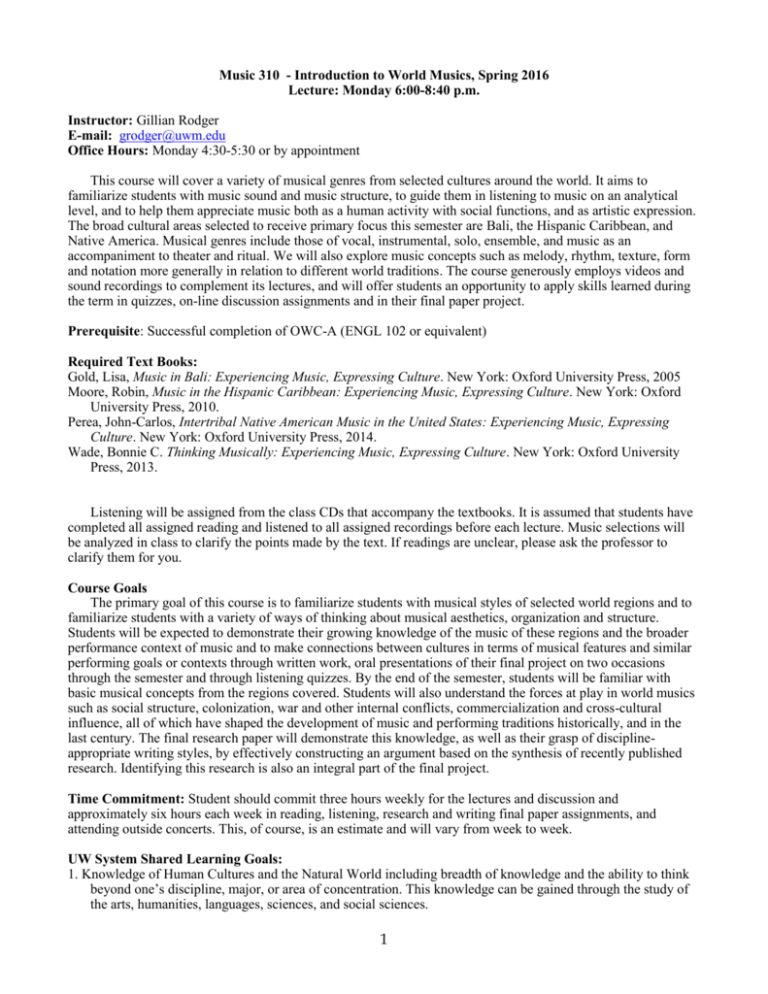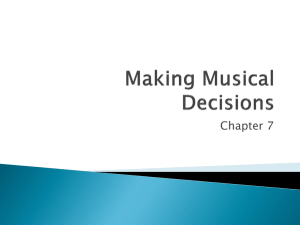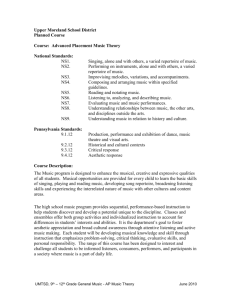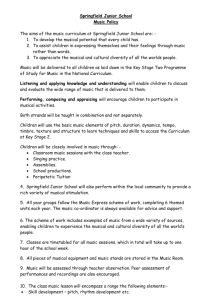Quizzes
advertisement

Music 310 - Introduction to World Musics, Spring 2016 Lecture: Monday 6:00-8:40 p.m. Instructor: Gillian Rodger E-mail: grodger@uwm.edu Office Hours: Monday 4:30-5:30 or by appointment This course will cover a variety of musical genres from selected cultures around the world. It aims to familiarize students with music sound and music structure, to guide them in listening to music on an analytical level, and to help them appreciate music both as a human activity with social functions, and as artistic expression. The broad cultural areas selected to receive primary focus this semester are Bali, the Hispanic Caribbean, and Native America. Musical genres include those of vocal, instrumental, solo, ensemble, and music as an accompaniment to theater and ritual. We will also explore music concepts such as melody, rhythm, texture, form and notation more generally in relation to different world traditions. The course generously employs videos and sound recordings to complement its lectures, and will offer students an opportunity to apply skills learned during the term in quizzes, on-line discussion assignments and in their final paper project. Prerequisite: Successful completion of OWC-A (ENGL 102 or equivalent) Required Text Books: Gold, Lisa, Music in Bali: Experiencing Music, Expressing Culture. New York: Oxford University Press, 2005 Moore, Robin, Music in the Hispanic Caribbean: Experiencing Music, Expressing Culture. New York: Oxford University Press, 2010. Perea, John-Carlos, Intertribal Native American Music in the United States: Experiencing Music, Expressing Culture. New York: Oxford University Press, 2014. Wade, Bonnie C. Thinking Musically: Experiencing Music, Expressing Culture. New York: Oxford University Press, 2013. Listening will be assigned from the class CDs that accompany the textbooks. It is assumed that students have completed all assigned reading and listened to all assigned recordings before each lecture. Music selections will be analyzed in class to clarify the points made by the text. If readings are unclear, please ask the professor to clarify them for you. Course Goals The primary goal of this course is to familiarize students with musical styles of selected world regions and to familiarize students with a variety of ways of thinking about musical aesthetics, organization and structure. Students will be expected to demonstrate their growing knowledge of the music of these regions and the broader performance context of music and to make connections between cultures in terms of musical features and similar performing goals or contexts through written work, oral presentations of their final project on two occasions through the semester and through listening quizzes. By the end of the semester, students will be familiar with basic musical concepts from the regions covered. Students will also understand the forces at play in world musics such as social structure, colonization, war and other internal conflicts, commercialization and cross-cultural influence, all of which have shaped the development of music and performing traditions historically, and in the last century. The final research paper will demonstrate this knowledge, as well as their grasp of disciplineappropriate writing styles, by effectively constructing an argument based on the synthesis of recently published research. Identifying this research is also an integral part of the final project. Time Commitment: Student should commit three hours weekly for the lectures and discussion and approximately six hours each week in reading, listening, research and writing final paper assignments, and attending outside concerts. This, of course, is an estimate and will vary from week to week. UW System Shared Learning Goals: 1. Knowledge of Human Cultures and the Natural World including breadth of knowledge and the ability to think beyond one’s discipline, major, or area of concentration. This knowledge can be gained through the study of the arts, humanities, languages, sciences, and social sciences. 1 3. Effective Communication Skills including listening, speaking, reading, writing, and information literacy. 4. Intercultural Knowledge and Competence including the ability to interact and work with people from diverse backgrounds and cultures; to lead or contribute support to those who lead; and to empathize with and understand those who are different than they are. GER Arts Goals: (a) Definition: A branch of learning focusing on the conscious use of skill and creative imagination in the production of artistic objects or performances that stress values that stand outside conventional ideas of utility. 1. demonstrate comprehension of historical, philosophical, theoretical, or aesthetic perspectives commonly used in the understanding of a specific art; 3. compare and contrast the expressive and formal features of different artistic media and/or cultural traditions; this may be accomplished through an analytic study or as part of an original artistic work. OWC-B Primary learning outcomes: 1. Students will be able to identify core library resources specific to the discipline. 2. Students will be able to identify, analyze, and synthesize appropriate information from primary and secondary sources. 3. Students will demonstrate logical organization of thesis, supporting evidence, and conclusion in their written presentations. 4. Students will demonstrate appropriate use of stylistic and disciplinary conventions in writing. Class Participation Students will be expected to attend class regularly and have completed the reading and listening assigned for each week. The reading assignments are listed under the class for which they are required. This is not a large class, so there is more room for class discussion, which is encouraged. Students will not be able to effectively take part in this discussion if they come to class unprepared. Class participation will contribute towards the final grade. I understand that sometimes it is not possible for students to be as prepared as one might like. I encourage students to let me know if there are other pressures in their lives making it impossible, on occasion, to attend class or to be adequately prepared. I also encourage students to e-mail me with questions they might have, or to see me during office hours. It is also possible to make appointments to meet outside of office hours. I ask all students who are unwell to not come to class. The University will not be closing due to the flu, but we have been asked to consider making contingency plans in the event of widespread illness on campus. Please watch the "Announcements" section of the class D2L site and your e-mail for updates. If you become ill, please notify me by e-mail and pursue appropriate medical treatment--I will work with you to make provisions to get you class notes and assignments via e-mail. University Policies The following link will connect you to a page where you can find the University’s policies regarding students with disabilities, religious observances, students called to active military duty, incompletes, discriminatory conduct, academic misconduct, complaint procedures, grade appeal procedures and final exam requirements: http://www.uwm.edu/Dept/SecU/SyllabusLinks.pdf. Please note that plagiarism is a serious academic offense. Students using work completed by others, whether found on the web, in a book, or written by other students, will at the very least fail the assignment. For serious cases I will initiate an academic disciplinary procedure. For a description of what this entails see: http://www4.uwm.edu/acad_aff/policy/academicmisconduct.cfm Quizzes During the semester there will be four short quizzes (approx. one for each geographic region, and one relating to terms and concepts). These quizzes will include listening examples as well as other questions relevant to the music culture. 2 There will be no make-ups for missed quizzes except under the most unusual circumstances. To request a make-up, a legitimate excuse must be submitted via e-mail before the quiz, or no later than one class period after the quiz and must be accompanied by written evidence, i.e. a doctor's excuse, etc. Quizzes from the first half of the term will not be made-up after Spring recess. D2L Discussion There are two discussion questions posted for each class session. Students need to answer one question each week and also respond to another student's contribution to either of the discussion threads. The aim of this exercise is for students to engage with musical and cultural issues as they read the text and prepare for the following week's class. This will also allow me to see which issues students are finding difficult and need to be covered more carefully in class. Grading: Listening Quizzes (4 Short) D2L Discussion Assignments Bibliography 1 (3 pgs) Bibliography 2 (10 pgs) Paper Outline (2-3 pgs) Draft Paper (12 pgs) Revised Paper (12 pgs) Class Participation Total 20 15 10 15 10 15 5 10 100 Papers-GER & OWC-B Assessment The term paper will be completed in a series of smaller assignments that build to the final paper. The aim of these assignments is for students to learn (if they have not already done so) or practice the research process that needs to be undertaken in writing a longer paper on an unfamiliar topic. GER & OWC-B ASSESSMENT SCALE – Final Paper: 4 = Superior degree of originality expressed throughout, full understanding expressed of the significance of the musical tradition in cultural and historical context; all research sources have been analyzed and interpreted thoughtfully, precisely and with complexity; excellent use of source material; ability to take initiative in assignment that augments what is learned; spelling and grammar correct throughout; self-initiated ideas in content. 3 = Above average degree of originality throughout; partial understanding expressed of the significance of the musical tradition in cultural and historical context; analysis and interpretation of research sources is present with some elaboration or understanding; ability to work and think independently; few errors in spelling and grammar. 2 = Average degree of originality throughout; the beginning of an understanding expressed of the significance of the musical tradition in cultural and historical context; analysis and interpretation of research sources is present with little elaboration or understanding; met minimum requirements of assignment; some initiative in working and independent thinking; frequent spelling and grammar errors. 1 = Below average originality; limited understanding expressed of the significance of the musical tradition in relationship to cultural and historical context; simple description lacking development of idea, evaluation, analysis or interpretation of research sources; little initiative in working or thinking independently; numerous spelling and grammar errors. 0 = Lack of originality and understanding; no description of the significance of the musical tradition in cultural and historical context; no analysis or interpretation of research sources when used; presentation is very weak, trite, stereotypical; unreadable due to spelling and grammar errors; very little or no initiative. See the Handouts Posted on D2L for an explanation of the Assignments plus deadlines. Note, deadlines are also noted in Bold in the syllabus below. Topic: Your choice, relevant to course content. 3 Length: Undergraduate papers should be at least 12 doubles spaced pages of text, not including the bibliography. Draft: Due on or before April 11. Multiple drafts may be submitted, but no drafts will be accepted after April 11. Final Paper: Can be handed in at the last class on Monday May 9, but the absolute deadline is Monday May 20. Students are encouraged talk to the instructor during office hours about the direction of this final paper. Goal of the Paper: To show that you can identify a musical or cultural issue relating to music of a single culture or region, gather information about it (musical, verbal and written), and synthesize your findings into a coherent, convincing, complete statement. Please note that you are not expected to undertake any original research. The synthesis of ideas found in existing current scholarship is the primary goal of this paper. Music 310: Introduction to World Music Class, assignment and quiz/exam schedule 1/25 Introduction. Class mechanics. Thinking About Music, Thinking About Instruments Reading Assignment: Thinking Musically, Chapters 1 & 2 (These ideas will be covered in the first class. Students will be responsible for completing the reading). 2/1 Bali: The Balinese Ceremonial Soundscape, Instruments: Materials, Tuning, and Timbre Reading Assignment: Music in Bali, Chapters 1 & 2 Listening Assignment: See call-outs in text 2/8 Thinking About Time, Thinking About Pitch Reading Assignment: Thinking About Music, Chapters 3 & 4 Listening Assignment: see call outs in text Bibliography 1 Due 2/15 Quiz 1 Bali: Musical Structures and Organization Reading Assignment: Music in Bali, Chapter 3; Thinking Musically, Chapter 5 Listening Assignment: See call-outs in text 2/22 Thinking Critically About Issues Bibliography 2: Questions, Advice Reading Assignment: 5Thinking Musically, Chapter 6 Listening Assignment: see call outs in text 2/29 Bali: Music, Theater and Dance Reading Assignment: Music Bali, Chapter 4 & 5 Listening Assignment: See call-outs in text Bibliography 2 Due 3/7 Quiz 2 Bali: Gong Kebyar and Conclusion Reading Assignment: Music in Bali, Chapter 6 & 7 Listening Assignment: See call-outs in text 3/13-20 Spring Recess 3/21 Intertribal Native America 4 Discussion: writing assignments Reading Assignment: Intertribal Native American Music, Chapter 1 Listening Assignment: See call-outs in text 3/28 Intertribal Native America Paper Outline due Reading Assignment: Intertribal Native American Music, Chapter 2 & 3 Listening Assignment: See call-outs in text 4/11 Intertribal Native America Draft Essays: All Students must submit a draft Reading Assignment: Intertribal Native American Music, Chapter 4-6 Listening Assignment: See call-outs in text 4/18 Quiz 3 Hispanic Caribbean Reading Assignment: Music in the Hispanic Caribbean, Chapter 1 & 2 Listening Assignment: See call-outs in text 4/25 Hispanic Caribbean Discussion: writing assignments (revising your paper) Reading Assignment: Music in the Hispanic Caribbean, Chapter 3 Listening Assignment: See call-outs in text 5/2 Hispanic Caribbean Reading Assignment: Music in the Hispanic Caribbean, Chapter 4 & 5 Listening Assignment: See call-outs in text 5/9 Quiz 4 Hispanic Caribbean Reading Assignment: Music in the Hispanic Caribbean, Chapter 6 & 7 Listening Assignment: See call-outs in text 5/20 Absolute deadline for Final Paper. GER & OWC-B ASSESSMENT 5






